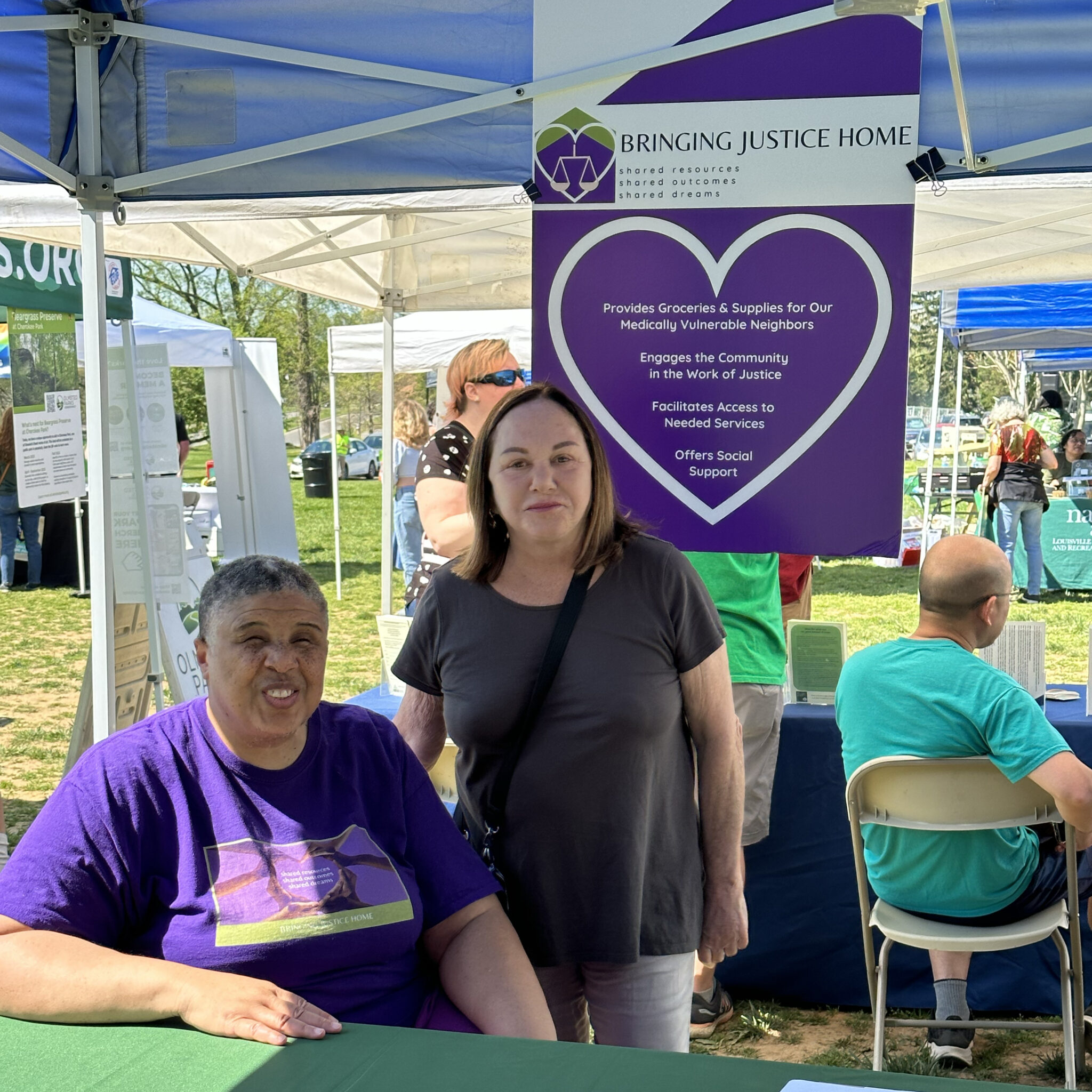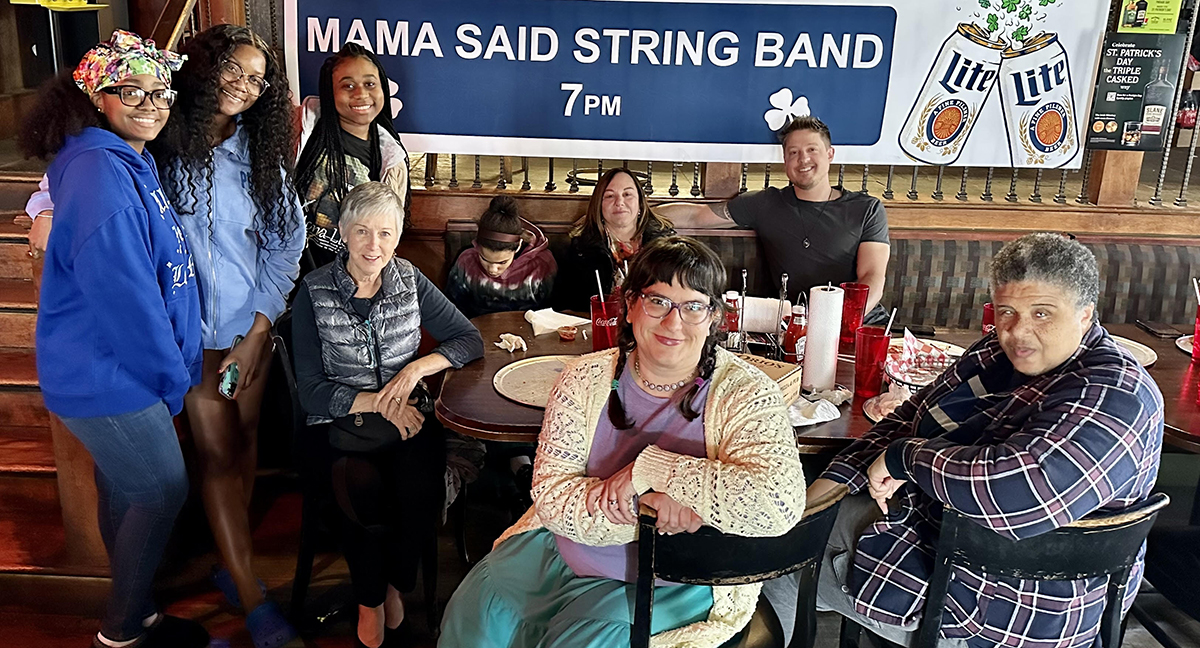Bringing Justice Home is a nonprofit organization committed to alleviating hunger caused by food insecurity for those facing disabilities and chronic or serious illnesses.
Now in its fourth year, the completely volunteer-run initiative seeks to facilitate food justice by delivering groceries and household supplies to health-compromised families and individuals who fall below the poverty line. Equally important is the relationship building that occurs as resources are shared and volunteers open their hearts to bringing justice closer to home.
Recipients of the services the organization provides are called neighbors rather than clients. The idea denotes an equal playing field, thus taking away stigma of having to ask for help. It promotes the concept of interdependence where all are equally valued.
“Bringing Justice Home is a new kind of neighborhood that goes beyond zip codes, race, disabilities, health labels or status,” says Constance Merritt, who co-founded the organization along with her wife, Maria Accardi. “It was begun at a time of uncertainty, during the pandemic. Food pantries were closed, and although there were places people could pick up meals, often they were unable to get there. ‘Healthy at home’ became ‘hungry at home’ for many.”
“Maria and I knew that a need existed, and we wanted to do something,” she adds. “One night we were washing dishes and I half-jokingly said, ‘Should we open up a food pantry in our scary basement?’ We knew we wanted to open a nonprofit, so we reached out to friends.”
Merritt and interested friends reached out to three local food pantries to see if they could find space to use that was climate controlled and secure. None had any room available. Finally, the thought emerged of picking up orders directly from Kroger and delivering from there.
Today, four out of the five current board members have been involved in food ministries of area churches. All wanted to do more, including developing a more personal touch than just a traditional food bank. Currently, there are three ways Bringing Justice Home serves the neighbors in their community: a monthly food delivery, a sponsored membership in a community-supported agriculture program, and a biannual delivery of pantry staples.
“Our neighbor advocates take the orders to be placed on the Kroger website for the customized monthly deliveries,” Merritt says. “They develop a relationship with their assigned neighbors who are dealing with varied health issues and may want to watch their sugar or salt intake. Pet food and household supplies are also available. The advocates might ask, ‘Are you sure you want to order this? It has 900 milligrams of sodium.’ The recipient is usually glad for that information and might adjust their order.”
“Currently we serve 52 families,” she continues. “Some make barely $700 a month, which is not enough to make ends meet. We partner with Barr Farms’ community-supported agriculture program, and biweekly neighbors get a box with five to seven organic items. Although we hope to do it quarterly, right now household staples deliveries are every six months. We use Walmart to deliver these pantry supplies.”
To become a neighbor in the Bringing Justice Home community, a form is available on the organization’s website. Many are referred from agencies or a person who alerts the organization to the neighbor’s circumstances. Potential recipients must have a disability, chronic health problem or serious health problem, and self-report that they are hungry due to eating less, cutting out food, skipping meals and struggling with low to very low food security.
Volunteers are always needed. “Bringers” deliver the food and other individuals check in with the recipients. During a recent call, a neighbor indicated that because of having access to healthy food, their A1C test, which measures the average amount of sugar in the blood, had dropped to 6.0, an acceptable level. The majority of those served have indicated a decrease in hunger.
Volunteers for the organization reap the benefit of serving others and working together with other like-minded individuals. Experiences, expertise and resources are shared to forge partnerships. They are encouraged to see the uniqueness of each person and family served. This sets Bringing Justice Home apart from other similar initiatives.

Bringing Justice Home seeks to bring to light the needs and wishes of community residents – a practice that fosters compassion and helps to eliminate prejudice and discrimination. The concept strengthens the community, and can ultimately make it stronger for future generations.
“Prospective volunteers can fill out an application on the website,” Merritt says. “The website also has job descriptions and online modules. We conduct an interview, and since we are working with a vulnerable population, volunteers must have a background check. Volunteers let us know their availability, and deliveries, which occur Monday through Saturday from 9 a.m. to 6 p.m., are set to match their schedules. The challenge for us right now is getting our name out there. We have no money for marketing and more donations than grants. When we started, our board members reached out to family and friends. We have participated in some giving days and mailer fundraisers. People can donate on our website for one-time and reoccurring gifts.”
Merritt is a published writer and a licensed social worker with a master’s degree from the University of Louisville. She has worked with older adults in low-income senior housing, patients and families in hospital palliative care, and individuals receiving HIV and AIDS services. In addition, she is visually impaired and knows firsthand the frustrations of seeking employment with a disability. She shares that seven out of every 10 people with a disability are unemployed.
“I had several aha moments when I thought about starting this organization,” Merritt says. “At the time I had just attended a retreat where I read some of Dr. Martin Luther King’s writings. Our vision is shared outcomes, visions and dreams.”
Merritt says she wonders what the world might look like if people had all they needed. She feels that food justice is social justice.
“People feel powerless and that there is nothing they can do, but this is a concrete thing,” Merritt says. “‘Yes’ is a powerful word, and saying ‘yes’ to supporting Bringing Justice Home or by volunteering is a concrete thing and gives hope. It empowers you and the people who benefit. Bringing justice home means bringing food justice and food security to people.”






Comments 1
Why are you spending $533 thousand dollars on a music therapist. And your CEO salary went from $244 thousand dollars to $520 thousand dollars?